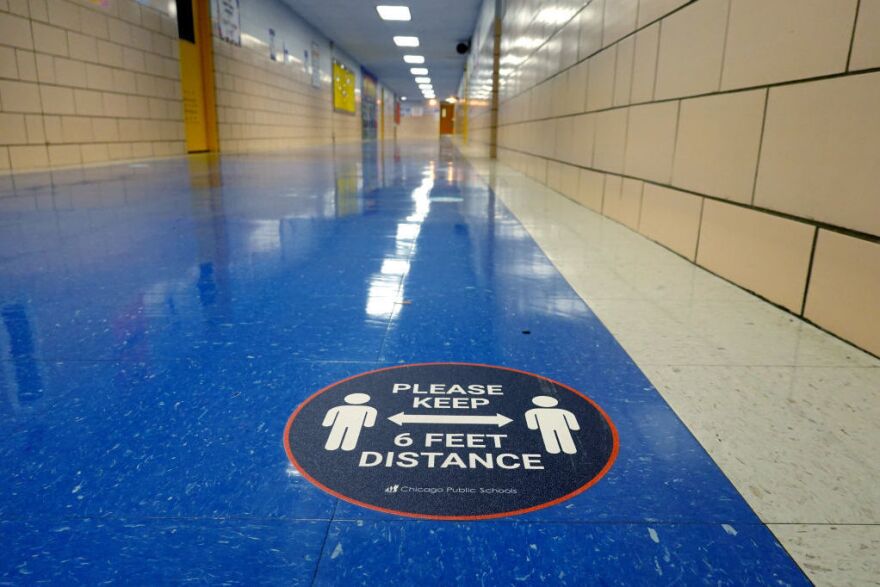Kids are carrying the trauma of the pandemic and, even if COVID is eventually defanged, it has already left indelible marks on students' psyches and education.
That's the warning of Chicago school principal, Seth Lavin.
As the pandemic has disrupted education across the country, the situation in Chicago has been particularly acute. The city's public school system shut down for five days earlier this month as the teachers union and city officials were in a standoff over COVID safety rules.
"Our schools are not OK. Children are not OK. Teachers are not OK," Lavin wrote in a recent commentary for the Chicago Sun-Times. "Yesterday we COVID-tested a line of students 300 children long. But this surreal circus is not the main plot of this year. The surge is ending. The crisis will still be here."
Lavin, who heads the Brentano Elementary Math & Science Academy (Pre-K - 8th grade), spoke with NPR's All Things Considered.
The interview has been edited for brevity and clarity.

What's not OK?
We've all been through so much in the past two years. Most of last year we were apart and now we're together again. Children and all of us are out of practice being a community. We've all lost a lot. We've all been hurt a lot. So, the children need help. They need love. The adults need help and love too. And so as a community, we're struggling through it.
How children carry the burdens of COVID

Kids have experienced loss and kids have lost experiences. They are carrying trauma and, even the ones who aren't carrying trauma from really terrible things happening during this pandemic, they've had experiences that kids shouldn't have and have lacked experiences that kids should have.
Their friendships are harder. Their emotions are bigger. Their ability to have empathy, and process with those around them, and notice the humans around them is lower. And that just makes everything more challenging in a school because, in a school, we are together and everything we do impacts the people around us directly.
I talk to friends of mine who are teachers, who are principals, and we all share these stories, just examples of things that worry us about our kids – stories that you wouldn't hear two or three years ago. A friend of mine who's a principal told me when I asked how she's doing, she said in the last three years, she had once gone through the process that you go through when a child has suicidal ideation, when they talk a lot about self-harm. She said [she has] done it four times in the last one month.

Too much focus on learning loss
It is objectively true that over the last two years, kids have not experienced the same lessons they would have, if school had just been in person. But, I really think there's too much focus on that or on this idea of learning loss, whatever that means.
What school does and what school is isn't just a sequence of lessons that you're supposed to get in order at the right time in order to grow up to be the person you're supposed to grow up to be. That's not what school is really about. School is about becoming the person you're meant to be through being in community and having experiences with others, learning who you are, learning how to be a person who shows up in a way that is good for others – and fractions and grammar.
So, yes, our kids missed out on things. They have experiences that they need to have, now, to grow into the people they need to be and to grow in community in the right way. That is all much more important and much more urgent than this idea that we need to somehow make up for the lessons that they didn't have because they were remote or because school was closed at a certain period of time. That stuff will come. The urgency is we need to help our kids feel safe and good in community at school, so they know how to be with others.
When will things get back to normal?
We can't pretend that we're not still in the present tense in the pandemic, and I think it's important to say that out loud because when we pretend the pandemic is over, when we pretend that these disruptions aren't still existing in school, when we pretend our kids aren't still experiencing the hardship that they're experiencing as a result of this pandemic, we aren't opening our eyes to what kids and teachers and schools and parents are actually experiencing, and in doing so, we create a disconnect and we make things worse.
I'm an optimist. I think the omicron surge ending is a really good thing and it may mean we have a time of lower cases and normalcy for a while. That'll give us a longer time of more calm and more stability and school, which is going to help kids and teachers feel more calm and more stable in their bodies and their classrooms to rebuild the community and do the work that we need to do.
But in the long term, this isn't a blip. I mean, this is now part of our collective experience. It's been a quarter of my younger son's life. It's not just a thing that happened. It's the world. So, we're going to be making sense of that forever.
We want to go back to normal, but we also always have to ask what normal even was. This moment, cataclysmic as it is, has to be a time when we rebuild the world in a better way. And I really think that people, schools, teachers and their kids and the parents they work with are doing that work classroom by classroom.
Copyright 2022 NPR. To see more, visit https://www.npr.org.





